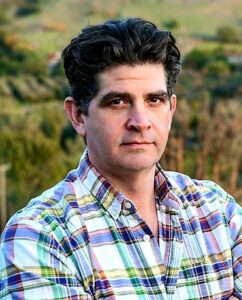In the ever-evolving landscape of Hollywood, few have navigated its complexities with the versatility and insight of Aaron Semmel. rom his early days studying film and creative writing at Columbia College, his passion for storytelling led him to his current role as a development consultant, writer, and producer, Semmel’s career offers a unique window into the inner workings of the entertainment industry. In this wide-ranging interview, he discusses his unconventional entry into Hollywood, the challenges of development, and offers advice for aspiring creatives.
Jeff Rivera: Can you tell us about your background and how you started in entertainment?
Aaron Semmel: I grew up in Chicago, always wanting to be a storyteller. In film school, I wrote a short story based on Herbie the Love Bug, which caught the attention of Disney executives. Though they didn’t buy my story, it inspired me to move to Los Angeles.
I started as an assistant at Maverick Films, Madonna’s production company. From there, I worked at Morgan Creek for James G. Robinson and Guy McElwaine, which I consider my “graduate school” in understanding how Hollywood works.
Later, I became director of development at Leslie Greif’s company, where I was involved in projects like “Hatfields and McCoys.” I was intricately involved in every aspect of the project from writing through production, all the way to the Emmy stage. That is where I became friends with Kevin Costner and went on to work closely with him as an independent development producer.
How did you manage to get your Herbie story to Disney executives?
It was a classic Hollywood story of “who you know.” A college friend who worked as an assistant at Disney helped me navigate the system. Through a chain of connections, I eventually got the story to Karen Glass, who had the “Herbie folder” at Buena Vista Pictures.
I learned a crucial lesson about getting an agent: tell them you have a meeting waiting at a major studio. That’s how I landed my first agent at ICM.
 What advice do you have for someone with international experience trying to break into the U.S. industry?
What advice do you have for someone with international experience trying to break into the U.S. industry?
Lean into your unique international perspective. The industry has become global, with platforms like Netflix and Amazon finding success with international content. Shows like “Squid Game” from Korea or “Outlander” from the UK have become huge hits.
When developing stories, think globally. Consider how your project can appeal across borders. Incorporate diverse characters and perspectives authentically, not just as tokenism.
Why don’t executives typically explain why they pass on pitched material?
The short answer is liability. As a development executive, my job is essentially to say no and find reasons to pass on projects. We’re looking for undeniable material that we can’t say no to.
There’s also a practical aspect: we only get so many “asks” in this industry. If you keep recommending subpar material, you lose credibility. At higher levels, we’re often deciding whether to spend millions of dollars on a project, so the bar is extremely high.
What’s your advice for aspiring creatives trying to break into the industry?
Be humble and willing to work hard. I started by working for free on a Roger Corman production, just to get my foot in the door. Show up early, be genuinely interested in what’s happening around you, and be ready to do whatever is asked of you.
Remember, there are thousands of people willing to take your place, many of whom have been laser-focused on this industry since childhood. You need to be prepared to work harder than everyone else.
Lastly, make your material undeniable. Anticipate every potential “no” or question an executive might have, and have answers ready. The more you can address potential objections upfront, the stronger your pitch will be.

